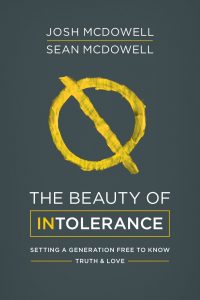Did Jesus Say Judge Not? That is the Question.

If cultural tolerance has a theme verse, it’s Matthew 7:1: “Judge not, that you be not judged.”
That verse, by the way, is one of most commonly misused verses in the Bible. Christians and non-Christians alike often take it out of context. “Sure,” they say, “scripture offers moral suggestions, but each of us is to interpret and apply them as we see fit. No one has the right to judge the actions of another as morally wrong.” To this they add this kicker: “Jesus said so himself.”
Actually, he didn’t. A thorough reading of the New Testament shows that Jesus had very clear views on immorality and sin. And he always pointed people toward God’s moral truth. So why the confusion among readers?
What Did Jesus Mean?
Chapter 7 of Matthew is the continuation of Jesus’ famous Sermon on the Mount. Throughout the sermon, Jesus presents a worldview for his disciples to follow, if they are to be members of his eternal kingdom. He tells them (and us) how to think, be, and live within it.
When we understand that context, Jesus’ meaning is clear when he says, “Do not judge.” It’s because his new kingdom already has a judge. God, who judges by His perfect standard of truth. When we condemn another person, we are presuming to determine who can and cannot be forgiven by God. That’s God’s job, not ours, and Jesus wants us to “get” that.
If you have seen a Christian look at someone and confidently declare, “That person is sooooooo going to hell,” that’s a problem. Worse, if they say it with an attitude of self-righteousness or even glee. That Christian needs a good deal of grace and prayer, because he’s forgotten that Christians aren’t to hold a view of “us against them”! Friends, we simply don’t have the right to determine where another person will spend eternity. In the blink of an eye, that person can choose to be saved, and their past no longer matters. I don’t know about you, but I rejoice in that amazing grace, because I was that person!
Both sides of the cultural tolerance debate, Christians and non-Christians alike, need to ask if they are truly offering others real tolerance. When we’re fueled by righteous indignation, the love we’re supposed to have in ready supply can quickly disappear. Jesus wants to put a screeching halt to that. We Christians are to offer everyone grace, despite their actions, even if we find ourselves being shown hatred. Who knows? It could be that those persons are simply returning the intolerance they felt first directed at them by Christians.
Jesus Doesn’t Hate Anyone
When we sin, is Jesus offended? Probably. But does he write us off, or start looking at us with less grace? Absolutely not. Though it’s almost impossible for our judgmental human brains to accept, we have God’s word on this. Remember the Bible parable of the lost sheep? Remember the Samaritan woman, the greedy tax collectors, the prostitutes, and all the other sinners Jesus met? He welcomed them. Like them, when we go astray, Jesus comes after us. God always sees us as worth rescuing!
After Jesus tells his listeners not to judge, he next says, “The standard you use in judging is the standard by which you will be judged (Matthew 7:2). Now, it could be that many Christians read this verse and break out in a clammy sweat. Knowing their own tendencies toward sinfulness, they likely think, “I better not judge anyone, for anything, in any situation, just to make sure I’m not harshly judged by God for my own sins.”
But that’s not what Jesus meant. Jesus never tells us to turn a blind eye to sin. Rather, he tells us to be careful in following two rules when we speak to others about their sin: 1) we must use the correct standard (God’s standard), and 2) we must not presume to pass the sentence of condemnation. How much we resemble the Bible Pharisees, when we judge by the wrong standard and are condemning.
The Pharisees judged people from the basis of their own legalistic rules. And they did so without concern for relationship. They condemned without mercy every single time someone violated their standard. Yet they saw themselves as perfect.
Jesus had this behavior in mind when he said, “How can you think of saying to your friend, ‘Let me help you get rid of that speck in your eye,’ when you can’t see past the log in your own eye? Hypocrite! First get rid of the log in your own eye; then you will see well enough to deal with the speck in your friend’s eye” (Matthew 7:4-5).
I don’t know about you, but I certainly don’t want God to say to me someday, “My child, I had a hard time telling you and the Pharisees apart.” Shudder!
Know the Truth, and Speak it Humbly
Brothers and sisters, when we speak the truth, even in love, we need to do so with humility. One of the accusations that proponents of cultural tolerance make against Christians is that we’re intolerant and arrogant. Yes, our belief in God’s “one way” can make us sound like we think we’re all that and a bag of chips. But we should never let our relationship with Christ lead us to feel superior to others who don’t yet know him.
Christians should not be concerned with “winning” arguments about who and what is right and wrong. We follow Jesus to experience a personal relationship with the creator of the universe. As Christians, we are to be “salt” and “light” to the world, letting our “good deeds shine our for all to see, so that everyone will praise [our] heavenly father” (Matthew 5:16).
Of course, no matter how lovingly and humbly we speak God’s truth, some people will choose to reject God’s love for them. Some will hate Him, and us, for our “intolerance.” Even Jesus, the most humble man of all, had his haters. As we strive to be like Jesus, let us ascribe to this: If people hate us, let’s just be sure that it’s because we genuinely follow Jesus’ teachings, not because we show the world an unbiblical attitude.
Thought to Ponder
I recently stumbled across an article in which the writer declared that society’s woes weren’t due to atheism, but to Christians possessing a “warped intolerance” toward people who “don’t subscribe to a deity.” What is your response to that? Knowing that many in society view your commitment to God’s truth as warped and intolerant, how might you stay strong in your convictions? How might you lovingly guide the people God puts in your life toward giving God a chance?
 This blog post has been adapted from the book The Beauty of Intolerance, by Josh and Sean McDowell.
This blog post has been adapted from the book The Beauty of Intolerance, by Josh and Sean McDowell.



